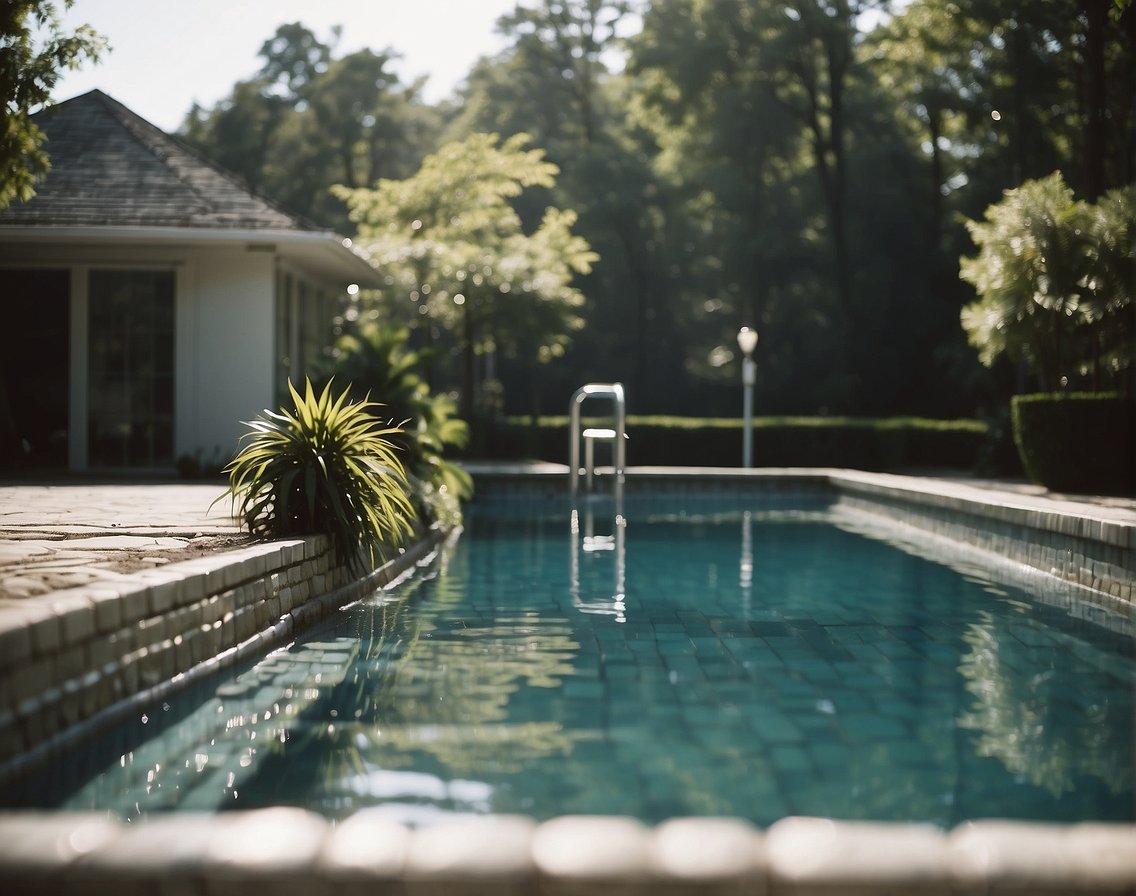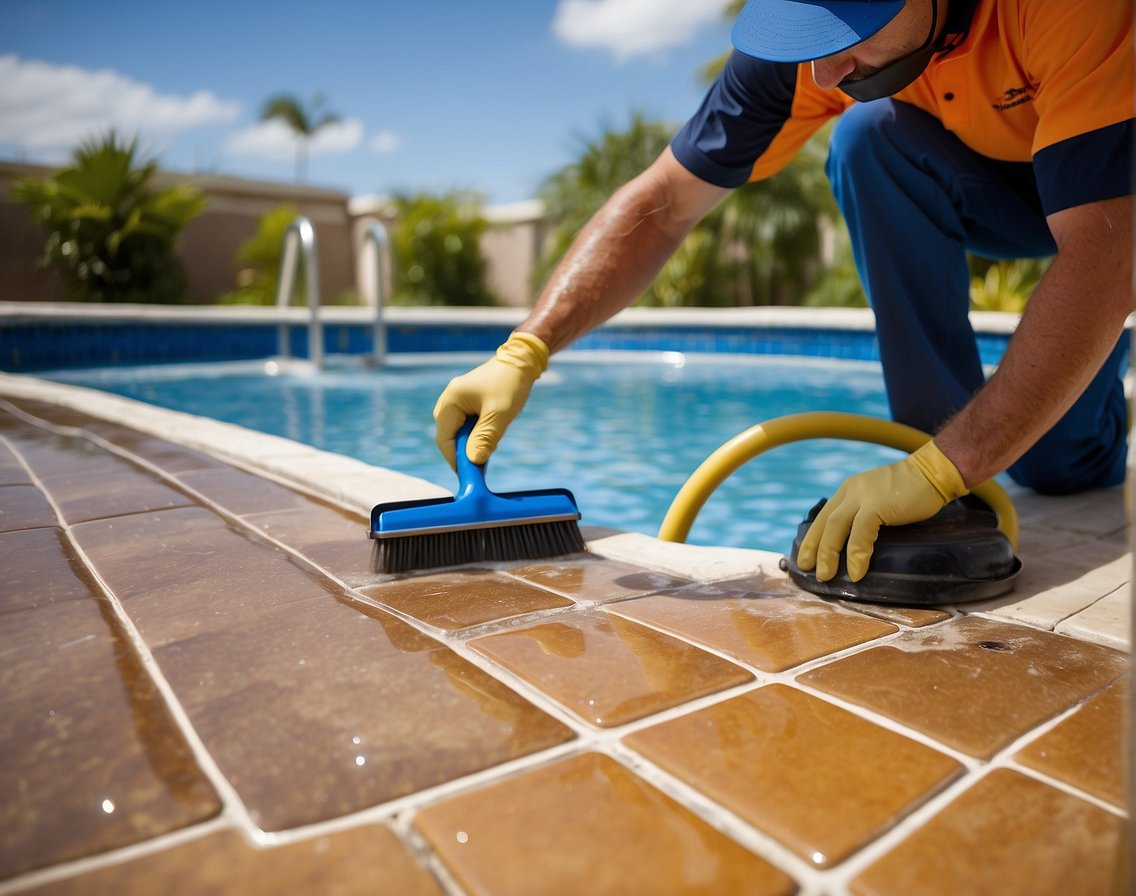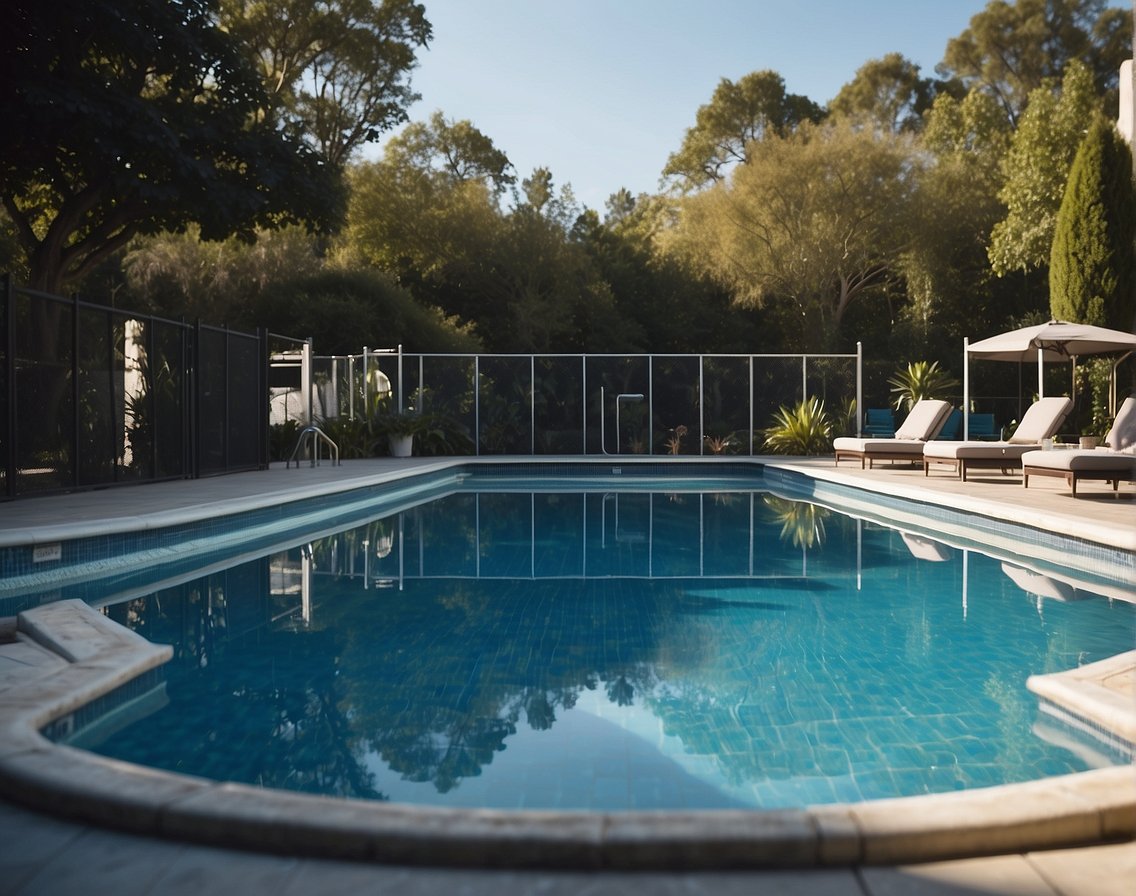Understanding Tile and Grout Cleaning in Georgia

When considering tile and grout cleaning in Georgia, we must appreciate the unique climate challenges that pool owners face. The combination of high humidity and hot summers can contribute to mold and mildew buildup, making regular cleaning essential for maintaining both aesthetics and hygiene.
Tile Types and Care
- Marble: A soft, porous stone requiring gentle cleaning and periodic sealing to prevent staining.
- Granite: Known for its durability, it still needs occasional sealing to maintain its luster.
- Travertine: This stone is porous and sensitive to acidic cleaners, thus sealing is recommended.
- Slate: Rustic and natural, slate benefits from sealing to enhance its appearance and protect against spills.
Cleaning Process
- Inspection: We start by inspecting the tiles and grout to determine the suitable cleaning approach.
- Cleaning: Utilizing non-acidic, pH-neutral cleaners to break down dirt without harming the tiles.
- Rinsing: Thoroughly rinsing the tiles to remove any cleaning residue.
- Drying: Allowing adequate time for the area to dry completely.
Grout Maintenance
Grout, being porous, acts like a sponge absorbing dirt and grime. It’s vital to keep it clean to prevent discolouration and degradation.
- Regular cleaning with pH-neutral solutions is recommended.
- Sealing grout can provide a barrier against moisture and contaminants.
Professional Assistance
For optimal results, it’s beneficial to engage certified technicians who are experienced in handling various tile types, including marble, granite, travertine, and slate. These professionals have the expertise to perform deep cleaning, appropriate sealing, and polishing without damaging the delicate surfaces of your pool tiles and grout.
Essential Pool Maintenance Practices

Maintaining a swimming pool in Georgia involves rigorous care to ensure its cleanliness and functionality. Our mission is to provide expertise on the most effective practices to keep pool environments healthy and enjoyable.
Regular Cleaning and Inspection
Weekly pool cleaning is not just about removing visible debris; it’s about preserving the quality of your swimming experience. We always start with the skimmer baskets, removing leaves and other materials that can clog the system. Vacuuming the pool floor is next, addressing dirt that can settle and become stubborn over time. Scheduling regular inspections helps identify potential issues with the pool’s structure or equipment before they require expensive repairs.
- Weekly Tasks:
- Empty skimmer baskets
- Vacuum pool floor
- Check for algae or sediment
Balancing Chemicals and Pool Systems
Balancing the water chemistry in your pool is crucial for preventing bacterial growth and ensuring swimmer comfort. Proper levels of pH, chlorine, and other pool chemicals need to be maintained. We frequently test the water and adjust the chemicals as necessary. Cleaning or replacing filters is also a part of this process; we recommend backwash or cartridge cleaning per manufacturer guidelines.
- Chemical Levels:
- pH: 7.4 – 7.6
- Chlorine: 1 – 3 ppm
- Alkalinity: 100 – 150 ppm
Seasonal Pool Care
Adjusting maintenance routines based on the season is important for both winterization and de-winterization. In preparation for winter, we ensure that all water is properly drained from the pipes to prevent freezing and damage. During the de-winterization process in spring, we conduct a thorough inspection and service all pool systems to prepare for the upcoming season.
- Winterization Checklist:
- Drain water from pipes and equipment
- Add winterizing chemicals
- Cover the pool securely
- De-Winterization Steps:
- Remove and store the pool cover
- Reinstall pumps and filters
- Test and balance water chemistry
Pool Safety and Liability in Georgia

In this section, we focus on the critical aspects of pool safety and liability for homeowners in Georgia. We discuss the proactive steps that can be taken to ensure safety and the legal implications of owning a swimming pool.
Preventive Measures to Avoid Accidents
As homeowners in cities like Atlanta, Alpharetta, Cumming, Duluth, and Johns Creek, we must adhere to the strict guidelines set forth by both local ordinances and state laws. It is crucial to implement a comprehensive set of safety measures:
- Fencing and barriers: Adequate fencing with self-latching gates that comply with the Consumer Product Safety Commission (CPSC) is paramount in safeguarding against accidental injuries, especially for children.
- Signage and rules: Clearly posted rules and warning signs around the pool area serve as a reminder and a legal safeguard. It’s important to include no diving signs if the pool is shallow.
- Regular maintenance: Employing a professional swimming pool service for regular maintenance and repair helps prevent accidents caused by faulty equipment or surfaces, especially in outdoor spas and pools.
Understanding Homeowner’s Responsibility
In Georgia, premises liability is a legal concept all homeowners with pools need to understand. This liability extends to injuries on your property, which includes drowning or pool-related accidents:
- Liability insurance: Checking with our insurance provider to ensure our policy covers personal injury related to our pool is crucial.
- Compliance: We must obtain all required permits and ensure our pool complies with all applicable rules and regulations to mitigate risks of liability.
- CDC and local regulations: Following guidelines from the CDC for pool safety and local health department regulations can help protect us from legal action in the event of an injury.
By taking the necessary precautions and being aware of our responsibilities, we can provide a safe swimming environment and protect ourselves from potential liability.
Frequently Asked Questions
We have compiled a list of common questions pool owners in Georgia ask about tile and grout cleaning, along with our expert advice.
What are the benefits of hiring a professional for pool tile and grout cleaning?
Hiring a professional for pool tile and grout cleaning ensures that you benefit from their expertise and specialized equipment, which often leads to more thorough cleaning and longer-lasting results. They can also identify and address any underlying issues, such as early signs of damage.
Which techniques do professionals use for cleaning pool tile and grout effectively?
Professionals typically use a combination of high-pressure water, chemical treatments, and manual brushing to clean pool tile and grout effectively. Some may also employ bead blasting for calcium deposit removal or steam cleaning for stubborn stains and algae.
What are the recommended maintenance practices for pool tile and grout longevity?
Regular maintenance practices include pH level balancing, weekly brushing to prevent algae buildup, prompt stain treatment, and periodic professional inspections. These practices extend the life of your pool’s tile and grout and maintain their appearance.
How can you prevent mold and mildew growth on pool tiles and grout?
Preventing mold and mildew growth involves maintaining proper water chemistry, ensuring water circulation, and keeping the pool area well-ventilated. Applying a sealant to grout lines can also help in creating a barrier against spore penetration.
Are there any specific considerations for saltwater pool tile and grout cleaning?
Saltwater pools require special attention since salt can leave deposits on tiles and degrade grout over time. Using a sealer specifically designed for saltwater environments and rinsing tiles with fresh water can help mitigate these effects.
What are the signs that your pool’s tile and grout need professional attention?
Signs that your pool’s tile and grout need professional attention include persistent stains, discoloration, loose tiles, crumbling grout, and efflorescence (crystalline deposits). Regular professional cleaning helps in preserving their functional and aesthetic qualities.
